GOOD NIGHT, AND GOOD LUCK: A Strong 2nd Opinion
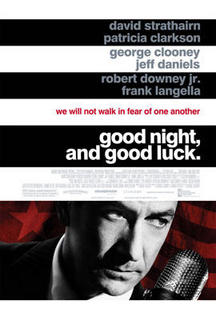 [To Read My Mixed Review Click Here.]
[To Read My Mixed Review Click Here.] Reviewed by Humby
George Clooney has hit the ball out of the park on his second try at directing. His first movie, CONFESSIONS OF A DANGEROUS MIND, displayed a talent for moving the camera, a unique visual approach, and a strong sense of storytelling. With GOOD NIGHT, AND GOOD LUCK, Clooney has made a movie that actually has something to say, which is all too rare in today’s cinema.
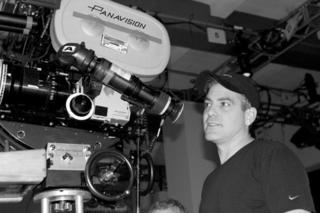 People who walk out of this film will probably fall into one of two groups. The first group believes that movies are there to first and foremost entertain. These people don’t think that we should be going to the movies to learn or be educated, but that we should go to laugh, cry, cheer and eat popcorn. These people will probably find the movie slow, dry and lacking the suspense that they are used to. While they might admire the film for its “importance”, they will be under whelmed and wish that it was more of a thriller. The other group of people believes that movies are capable and maybe even a little responsible to be more than just entertainment. They want a film of substance and importance. This is a film for that group.
People who walk out of this film will probably fall into one of two groups. The first group believes that movies are there to first and foremost entertain. These people don’t think that we should be going to the movies to learn or be educated, but that we should go to laugh, cry, cheer and eat popcorn. These people will probably find the movie slow, dry and lacking the suspense that they are used to. While they might admire the film for its “importance”, they will be under whelmed and wish that it was more of a thriller. The other group of people believes that movies are capable and maybe even a little responsible to be more than just entertainment. They want a film of substance and importance. This is a film for that group. 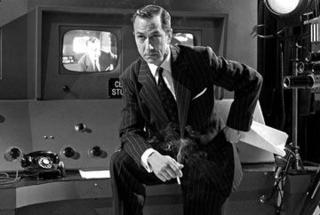 This is a movie about one man (the legend of television and radio, Edward R. Murrow) standing up to a giant (Senator Joseph McCarthy) during the peak of the communist witch hunt of the early 50’s. While newspapers had already been attacking the methods of McCarthy, Murrow was the first one to do so through national television, using his weekly show “See It Now”. The movie is book ended by Murrow’s famous speech at the 1958 Radio and Television News Directors Association convention. In this speech, he warned of the dangers of where television journalism was headed, urging his colleagues to accept the responsibility the do what was right, rather than what was good for ratings. This speech rings true more today than ever.
This is a movie about one man (the legend of television and radio, Edward R. Murrow) standing up to a giant (Senator Joseph McCarthy) during the peak of the communist witch hunt of the early 50’s. While newspapers had already been attacking the methods of McCarthy, Murrow was the first one to do so through national television, using his weekly show “See It Now”. The movie is book ended by Murrow’s famous speech at the 1958 Radio and Television News Directors Association convention. In this speech, he warned of the dangers of where television journalism was headed, urging his colleagues to accept the responsibility the do what was right, rather than what was good for ratings. This speech rings true more today than ever.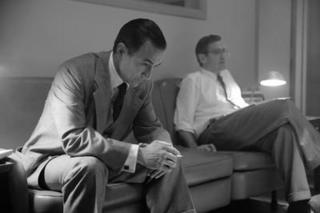 GOOD NIGHT, AND GOOD LUCK is not a biopic about Murrow, but an account of an extremely important event in US history. While showing his faults, it presents Murrow as the hero he was and calls for people today to have the same courage. Playing Murrow is David Strathairn (a character actor that most will recognize, but few will know) in a pitch perfect performance. A lot of the film recreates Murrow's broadcasts, and Strathairn bears a striking resemblance to the famous journalist. This is not purely a performance of mimicry though, but the difficult task of capturing a legend and presenting him on screen. Since the film is about the event, we never go home with Murrow or get to know him outside of CBS, but we do get to know what kind of person he is and the sense of moral obligation that drives him. Through him and his producing partner Fred Friendly (played in a great, understated performance by Clooney) we see that going after McCarthy is less of a choice and more of a necessity. They cannot simply stand by and ignore the atrocities taking place.
GOOD NIGHT, AND GOOD LUCK is not a biopic about Murrow, but an account of an extremely important event in US history. While showing his faults, it presents Murrow as the hero he was and calls for people today to have the same courage. Playing Murrow is David Strathairn (a character actor that most will recognize, but few will know) in a pitch perfect performance. A lot of the film recreates Murrow's broadcasts, and Strathairn bears a striking resemblance to the famous journalist. This is not purely a performance of mimicry though, but the difficult task of capturing a legend and presenting him on screen. Since the film is about the event, we never go home with Murrow or get to know him outside of CBS, but we do get to know what kind of person he is and the sense of moral obligation that drives him. Through him and his producing partner Fred Friendly (played in a great, understated performance by Clooney) we see that going after McCarthy is less of a choice and more of a necessity. They cannot simply stand by and ignore the atrocities taking place. 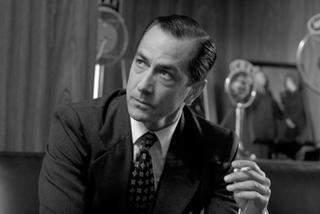 The rest of the cast is filled out with great actors. Robert Downey Jr., Patricia Clarkson, Jeff Daniels, Frank Langella, and Ray Wise all play important supporting roles. It might bother some, but this is not a movie about them. It is about a battle between two men. Who, you may ask, played the part of the infamous Joseph McCarthy? Well, none other that McCarthy himself. Clooney brilliantly decides to use actual footage of the senator. We never meet McCarthy because as in real life, he was always safely hidden behind the television screen and his imaginary list of communist names. The use of real footage could have easily played as a gimmick, but it puts the audience in the story with Murrow and Friendly.
The rest of the cast is filled out with great actors. Robert Downey Jr., Patricia Clarkson, Jeff Daniels, Frank Langella, and Ray Wise all play important supporting roles. It might bother some, but this is not a movie about them. It is about a battle between two men. Who, you may ask, played the part of the infamous Joseph McCarthy? Well, none other that McCarthy himself. Clooney brilliantly decides to use actual footage of the senator. We never meet McCarthy because as in real life, he was always safely hidden behind the television screen and his imaginary list of communist names. The use of real footage could have easily played as a gimmick, but it puts the audience in the story with Murrow and Friendly.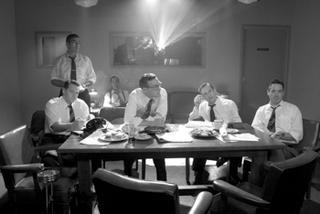 Another big part of what makes this movie work is the stunning cinematography by D.P. Robert Elswit. He is mainly known for fantastic work with director P.T. Anderson (HARD 8, BOOGIE NIGHTS, MAGNOLIA, PUNCH DRUNK LOVE), but Elswit steps up here and delivers a beautiful film. This movie is in black and white, which helps with blending the real and dramatic footage. You believe Strathairn is Murrow and Clooney is Friendly, just as you know that McCarthy is McCarthy. The bright whites and stark blacks are beautiful to look at, as is the constant cigarette smoke that swirls in the air. This is a time when every one seemed to smoke and you could and did smoke on the air while reporting the news. Murrow’s program “See It Now” was actually sponsored by a cigarette company. (On a side note: Murrow died of lung cancer in 1965).
Another big part of what makes this movie work is the stunning cinematography by D.P. Robert Elswit. He is mainly known for fantastic work with director P.T. Anderson (HARD 8, BOOGIE NIGHTS, MAGNOLIA, PUNCH DRUNK LOVE), but Elswit steps up here and delivers a beautiful film. This movie is in black and white, which helps with blending the real and dramatic footage. You believe Strathairn is Murrow and Clooney is Friendly, just as you know that McCarthy is McCarthy. The bright whites and stark blacks are beautiful to look at, as is the constant cigarette smoke that swirls in the air. This is a time when every one seemed to smoke and you could and did smoke on the air while reporting the news. Murrow’s program “See It Now” was actually sponsored by a cigarette company. (On a side note: Murrow died of lung cancer in 1965). 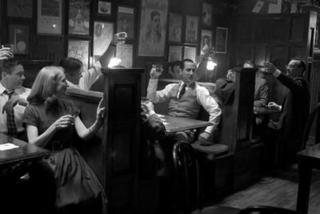 Another part of the movie I loved, but some did not, is the use of jazz music at points throughout the film. Aside from liking the actual music, it added to the ambience and put you in the time period. The music is almost as important as the black and white to capture the early 50’s. In a bold choice, Clooney did not just play period music in the film; he cuts to a lounge singer recording an album at CBS. This is not just a trick, but it keeps the realism to what we are watching. He incorporates the music into the world.
Another part of the movie I loved, but some did not, is the use of jazz music at points throughout the film. Aside from liking the actual music, it added to the ambience and put you in the time period. The music is almost as important as the black and white to capture the early 50’s. In a bold choice, Clooney did not just play period music in the film; he cuts to a lounge singer recording an album at CBS. This is not just a trick, but it keeps the realism to what we are watching. He incorporates the music into the world. This film might be dismissed as little more than a documentary. It is so much more than that. Watching this film reminded me of what Truman Capote did for writing with his masterpiece “In Cold Blood”, basically creating the genre of the non-fiction novel. This is a docu-drama. ALL OF THIS ACTUALLY HAPPENED! That alone makes it more compelling than most any movie that will be made this year.
It is obvious that GOOD NIGHT, AND GOOD LUCK was a very important and personal movie for Clooney. Like Murrow, this was not a story that he had a choice in telling. In today’s political climate, he found it necessary to tell this story. That passion comes across in the film. I hope that people not only see this film, but pay attention to what it has to say, because it is all too rare that a movie actually has something to say, let alone say it with such confidence and intelligence.




0 Comments:
Post a Comment
<< Home